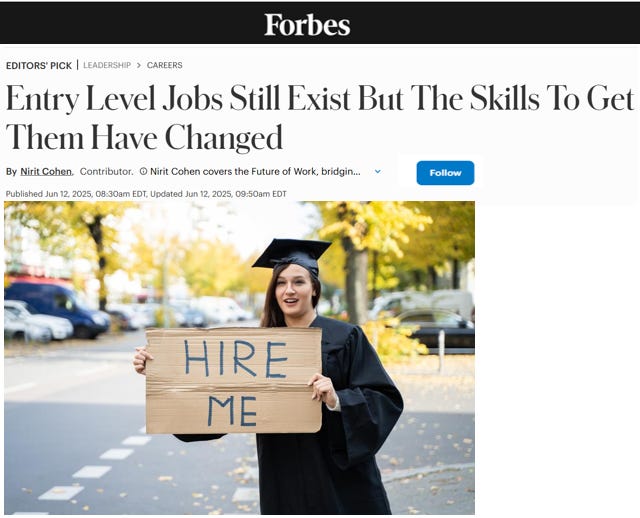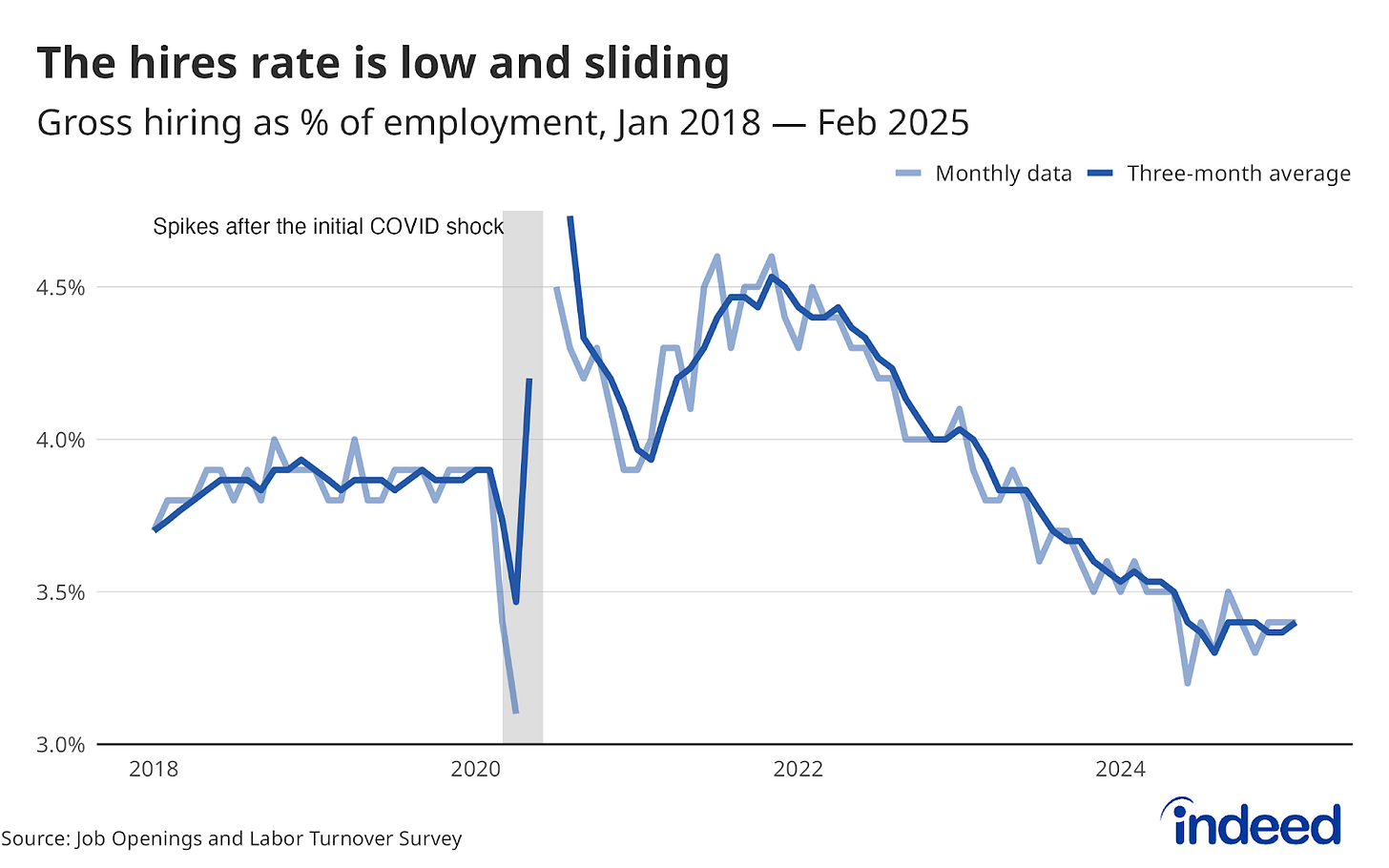Entry Level Jobs Still Exist But the Skills to Get Them Have Changed
AI is changing what entry level jobs require. We trained young people for the wrong skills. It’s time to rethink education, experience, and the path to work.
We told a generation: Learn to code. Skip the humanities. Master the technical.
Secure the future. Now? AI is doing the work we trained them for.
This week’s thought letter argues that it’s time to rethink what we teach—and bring back what we left behind.
Served weekly with❤️,
Nirit
This article was initially published on Forbes»»
What if entry-level jobs aren’t disappearing?
What if we’re just not preparing students for what those jobs now require?
We told an entire generation the future was theirs if they just learned to code.
We redesigned high schools around robotics labs. Gutted liberal arts departments. Laughed at philosophy majors. We promised that mastering logic, math, and engineering would lead to safe, well-paying jobs.
Now AI is writing the code. And the jobs we built the system around? They're the first to go.
The uncomfortable truth is this: we spent decades preparing young people to act like machines—just in time for the machines to take their place.
But maybe the problem isn’t that the first rung of the career ladder has disappeared. Maybe it’s that it moved—and we’re still looking in the wrong place.
A Shift We Didn’t See Coming
Entry-level roles once designed to train analysts, marketers, developers, and support staff are no longer the default path in. Employers are using AI to do that work faster, cheaper, and without the ramp-up time. And the people left standing aren’t the ones with the freshest degrees or the most technical certifications. They’re the ones with judgment. Experience. Context. Humanity.
According to the latest JOLTS data, the U.S. hiring rate has fallen to its lowest point in over seven years. Zoom in on early-career roles and the drop is sharper: new postings for white-collar entry-level jobs fell 12.7% over the past year, according to Revelio Labs. Business analyst and software development roles dropped closer to 25%.
And the trend is accelerating. Dario Amodei, CEO of AI company Anthropic, recently warned we’re “sleepwalking into mass unemployment,” predicting that AI could eliminate up to 50% of entry-level knowledge work within five years. These aren’t factory jobs. These are the junior roles in finance, tech, media, law—the very ones we’ve told young people to chase.
But this isn’t the beginning of a collapse. It’s the beginning of a correction. One that reveals not just what’s changing, but what’s missing.
We Trained People for the Wrong Advantage
AI doesn’t replace much of what makes up experience. It doesn’t navigate ambiguity, weigh ethical trade-offs, or read the room in a tense client meeting. It doesn’t know when to speak up, when to hold back, or how to build trust across a team that doesn’t report to you.
These are the skills that used to be learned on the job—through years of context, exposure, and failure. But if AI is absorbing the roles that once taught them, then we’re left with a clear mandate: we need to teach earlier the things we used to expect time and tenure to deliver.
While AI automates technical skills faster than we can redesign the next curriculum, it still can’t connect, interpret, imagine, or lead with moral clarity. In an AI-powered world, it’s no longer the person with the best answer who wins—it’s the one who can ask the best question, see the bigger picture, and lead others through uncertainty.
But we haven’t been training for that. In the U.S., the share of humanities degrees has dropped from over 17% in the late 1960s to just 8.8% by 2022. Since 2000, the share of bachelor’s degrees in English, history, and foreign languages has been cut nearly in half. Philosophy majors, once at 0.6%, now make up only 0.4% of all degrees awarded.
This was framed as progress. As pragmatic.
Now we’re discovering it was shortsighted.
Human Skills Are the Hard Edge
The skills most needed today aren’t “soft.” They’re foundational.
Empathy. Storytelling. Negotiation. Ethics. Cultural fluency. Pattern recognition across complex systems. Creative thinking in undefined contexts.
These aren’t cultivated in code academies or spreadsheets. They’re shaped in the very disciplines we’ve systematically deprioritized: literature, anthropology, sociology, philosophy, history, political science. Not as nostalgia—but as strategy.
Because in a world where AI can answer almost anything, the real value lies in knowing what to ask, how to frame it, and why it matters.
If we want to prepare young people for a world where machines can do the tasks but not the thinking, we need to rebuild the foundation. That means bringing the humanities back—not as electives, but as core career infrastructure. It means rethinking how we measure talent, valuing perspective, presence, and adaptability alongside performance. And it means rebalancing—not replacing—STEM with ethics, systems thinking, and human insight.
This isn’t about going backward. It’s about finally catching up to the world we’re already living in.
We optimized a generation for technical efficiency—just as AI made technical skills abundant.
Now we need to optimize for something else: being deeply, unmistakably human.
Because when the machines take the data, the value will live in the mind that sees meaning—and the heart that knows why it matters.
What’s the one question we should all be asking ourselves about the future of work?
I end every episode of The Future of Less Work podcast with this question. Alex Adamopoulos, CEO of Emergn gives us food for thought…
Watch | Listen to the full episode here»
Your Turn:
What’s one skill you wish school had taught you?
Served weekly with ❤️,
Nirit
![TheFutureOfLess[?]Work](https://substackcdn.com/image/fetch/$s_!2GIG!,w_80,h_80,c_fill,f_auto,q_auto:good,fl_progressive:steep,g_auto/https%3A%2F%2Fsubstack-post-media.s3.amazonaws.com%2Fpublic%2Fimages%2Feaee5ab5-0825-4b77-be17-20871805b782_1280x1280.png)
![TheFutureOfLess[?]Work](https://substackcdn.com/image/fetch/$s_!LoGg!,e_trim:10:white/e_trim:10:transparent/h_72,c_limit,f_auto,q_auto:good,fl_progressive:steep/https%3A%2F%2Fsubstack-post-media.s3.amazonaws.com%2Fpublic%2Fimages%2Ffcc9d426-5684-49a5-8d01-fa4b458d333c_2801x534.jpeg)

![TheFutureOfLess[?]Work](https://substackcdn.com/image/fetch/$s_!2GIG!,w_36,h_36,c_fill,f_auto,q_auto:good,fl_progressive:steep,g_auto/https%3A%2F%2Fsubstack-post-media.s3.amazonaws.com%2Fpublic%2Fimages%2Feaee5ab5-0825-4b77-be17-20871805b782_1280x1280.png)

